
February 16, 2026


| "It is better to help kids first learn what math is before moving on to electronic aids." —Marcy McLeod, an elementary school teacher in Los Angeles |
Large-scale retailers and manufacturers are still doing good business with ELAs. However, the advent of inexpensive home computers and educational software within the last five years has slowed their growth in specialty stores.
Educators favor manipulative aids, not electronic ones. After consulting with several specialty retailers, TDmonthly discovered that their customers, too, preferred manipulative devices instead of ELAs.
Cathy Seely, president of The National Council of Teachers of Mathematics, a nonprofit group dedicated to improving mathematics education, stressed that children need to “make sense of math, be able to do it and do something with it.” Seely said that this is best accomplished with manipulative, hands-on and verbal-based methods.
Educators stress when children first begin learning math, they have yet to develop the ability for abstract thought. They need to see real, concrete evidence for what they are doing. With electronic apparatuses, children tend to memorize the results without understanding the concept.
For beginning math, educators use a variety of tools, including marbles, beads and various animal figures. Laura Whitbread, a Montessori teacher in Los Angeles, feels, “Once the child masters the concept of what math is, it becomes almost second nature, and then they can move on to more difficult, advanced mathematics, including multi-number addition, subtraction, multiplication, division and fractions.”
Karen Barwick, owner of Boomerang Toys in New York City, stocks only a few electronic math toys. “We believe in a much more hands-on approach, as does our customer base,” she said.
Nick Ionoff, owner of a Learning Express franchise in Belmont, Calif., noted that his most popular math aids used to be the electronic/interactive type, but today his best-sellers are old-fashioned workbooks and blocks. “It’s what teachers want and what parents want,” Ionoff concluded.
Todd Merryfield, owner of The Learning Shop stores in Wisconsin — a specialty store featuring educational toys and classroom supplies — stocks limited electronic/interactive learning aids, although Math Shark by Educational Insights (ToyDirectory), has been a popular ELA item. Merryfield said that his clientele want products, “to reinforce what the teachers are teaching, and that’s best done with hands-on, manipulative toys like old fashioned blocks and beads” for ages 3 through 6. For older kids, "ELA is more of a tool used at home to help reinforce math skills learned in school.”
Despite the trend, a number of electronic math aids are popular and practical. Manufacturers of ELAs who were surveyed said that they were experiencing record-setting years.
James Whitney, president of Southern Calif.-based Educational Insights, manufactures a variety of hand-held ELAs. Whitney said that the company’s philosophy is to create manipulative toys that allow “the teacher and parent to decide what works for the individual child.” Their products follow, “a pedagogical concept,” said Whitney. Ideally, the user develops skills so that — without thinking — he or she knows that nine multiplied by nine equals 81.
Creative Teaching Associates (ToyShow) is a Central Calif.-based manufacturer of Power Learning games — a series of non-electric interactive games especially designed to challenge and motivate students. Mark Carlson, director of sales and marketing, said that his products are “self-correcting, have computational intensity, and help develop verbal communication.” More advanced than blocks and marbles, but more manipulative than ELAs, Carlson said that “Power Learning games saw record sales numbers in 2004 and are on pace to exceed that in 2005.”
The following are some popular interactive math aids and ELAs:
Math Shark by EDUCATIONAL INSIGHTS INC. Educational Insights’ top seller in the electronic learning device category, this handheld is a battery-operated flash card game used to quiz kids on addition, subtraction, multiplication, division, fractions, decimals and percentages. It has eight levels of difficulty. The user sees concrete results and receives instant feedback. 7/11/2005 (Age: 6 and Up)
Educational Insights’ top seller in the electronic learning device category, this handheld is a battery-operated flash card game used to quiz kids on addition, subtraction, multiplication, division, fractions, decimals and percentages. It has eight levels of difficulty. The user sees concrete results and receives instant feedback. 7/11/2005 (Age: 6 and Up)
See N' Solve by EDUCATIONAL INSIGHTS INC.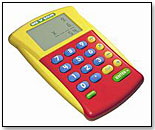 This handheld ELA is a calculator with an over-sized LCD screen designed to helps kids improve their basic math skills. Problems are displayed vertically, just as a teacher would write them on the blackboard. Unlike traditional calculators, See N’ Solve displays the whole problem in the window, not just the last entry.
7/11/2005 (Age: 6 and Up)
This handheld ELA is a calculator with an over-sized LCD screen designed to helps kids improve their basic math skills. Problems are displayed vertically, just as a teacher would write them on the blackboard. Unlike traditional calculators, See N’ Solve displays the whole problem in the window, not just the last entry.
7/11/2005 (Age: 6 and Up)
Original Talking Little Lite Checker ™ by FAST HANDS The Original Talking Little Lite Checker ™ is a portable battery-operated scanner that lets kids pretend they’re working in a real store. Children can scan objects across the Little Lite Checker or use the Hand Scan™. The toy comes with a shoulder strap to let kids take it anywhere. Because no table is required, special needs children in wheelchairs can also enjoy the buzzer sounds and changing lights as they watch the counter add up the objects scanned. Pressing “total” lets kids hear how many objects they have scanned, as well as see the number, making this a great toy to teach counting basics. This company might no longer be in business. 12/6/2004 (MSRP: $15.50)
The Original Talking Little Lite Checker ™ is a portable battery-operated scanner that lets kids pretend they’re working in a real store. Children can scan objects across the Little Lite Checker or use the Hand Scan™. The toy comes with a shoulder strap to let kids take it anywhere. Because no table is required, special needs children in wheelchairs can also enjoy the buzzer sounds and changing lights as they watch the counter add up the objects scanned. Pressing “total” lets kids hear how many objects they have scanned, as well as see the number, making this a great toy to teach counting basics. This company might no longer be in business. 12/6/2004 (MSRP: $15.50)
Addattack by CREATIVE TEACHING ASSOCIATES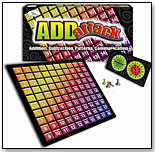 Players use a spinner to determine where to move colored markers on the brightly colored game board. Players must use addition to move. In Subattack-mode, they use subtraction. 7/11/2005 (Age: 7 to 11)
Players use a spinner to determine where to move colored markers on the brightly colored game board. Players must use addition to move. In Subattack-mode, they use subtraction. 7/11/2005 (Age: 7 to 11)
Decisions by CREATIVE TEACHING ASSOCIATES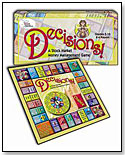 This 2- to 4-player game teaches money management skills in the context of the stock market. Players maintain accurate records of purchases/sales and must verbally explain how they determined the answer. The player with the highest cash net worth wins.
7/11/2005 (Age: 10 and Up)
This 2- to 4-player game teaches money management skills in the context of the stock market. Players maintain accurate records of purchases/sales and must verbally explain how they determined the answer. The player with the highest cash net worth wins.
7/11/2005 (Age: 10 and Up)
Integer Chess by CREATIVE TEACHING ASSOCIATES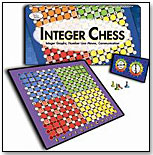 This game helps develop algebra skills. Players learn to develop graphing skills by making vector-like moves on the coordinate plane. The level of play ranges from novice to advanced.
7/11/2005 (Age: 8 to 13)
This game helps develop algebra skills. Players learn to develop graphing skills by making vector-like moves on the coordinate plane. The level of play ranges from novice to advanced.
7/11/2005 (Age: 8 to 13)
Learning Wrap Ups Math Introductory Kit by LEARNING WRAP-UPS INC.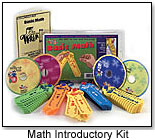 Motivate children to build on their own success! This innovative, self-correcting manipulative tool helps children master addition, subtraction, multiplication, division and fractions at their own pace. Classroom tested to work with any curriculum, it´s easy and fun to use. The kit includes a teacher´s guide with ideas, activities, charts and award certificates. Suitable for home school families, tutors, parents and teachers who deal with students of varying skill levels. Four corresponding audio CDs are also available. This nine component kit has an $81 value when components are purchased separately. - Aire Norell 12/23/2004 (MSRP: $49.99)
Motivate children to build on their own success! This innovative, self-correcting manipulative tool helps children master addition, subtraction, multiplication, division and fractions at their own pace. Classroom tested to work with any curriculum, it´s easy and fun to use. The kit includes a teacher´s guide with ideas, activities, charts and award certificates. Suitable for home school families, tutors, parents and teachers who deal with students of varying skill levels. Four corresponding audio CDs are also available. This nine component kit has an $81 value when components are purchased separately. - Aire Norell 12/23/2004 (MSRP: $49.99)
The Learning Palette Base Unit by LEARNING WRAP-UPS INC.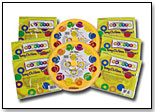 This educational set helps children to learn the alphabet and solve math problems. The set includes one plastic base unit, 12 color-coded disks, an instruction card and a lid that screws on tight to keep loose pieces from getting lost between uses. The cards provide a self-correcting aid for children; after matching the colored disks with the correct picture on the card, the card is flipped over to reveal the correct placement of colors. 5/10/2005 (MSRP: $14.99)
This educational set helps children to learn the alphabet and solve math problems. The set includes one plastic base unit, 12 color-coded disks, an instruction card and a lid that screws on tight to keep loose pieces from getting lost between uses. The cards provide a self-correcting aid for children; after matching the colored disks with the correct picture on the card, the card is flipped over to reveal the correct placement of colors. 5/10/2005 (MSRP: $14.99)
Math Rods Activity Set by LEARNING RESOURCES INC.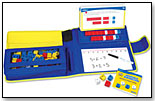 This three-in-one set features cubes that snap together for solving math problems. It also includes a dry erase board so kids can write down the problems. Skills practiced include addition, subtraction, counting, sorting and grouping.
8/4/2005
This three-in-one set features cubes that snap together for solving math problems. It also includes a dry erase board so kids can write down the problems. Skills practiced include addition, subtraction, counting, sorting and grouping.
8/4/2005
The Beginning Fraction Zone Bingo Game by LEARNING RESOURCES INC.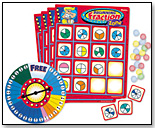 For children learning fractions, this game is a fun and easy game. Players make a standard bingo card and identify various fractions. Two levels of game play are available.
8/4/2005 (Age: 6 and Up)
For children learning fractions, this game is a fun and easy game. Players make a standard bingo card and identify various fractions. Two levels of game play are available.
8/4/2005 (Age: 6 and Up)
Dino Tracks Math Game by LEARNING RESOURCES INC.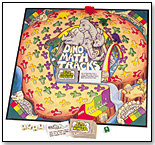
In this math game, children roll die and move their dinosaur species game piece the appropriate numeric place (ones, tens, hundreds, thousands). Intended for various levels of play, the game comes with math problem solving cards.
8/4/2005
Math Counters Baby Bears by LEARNING RESOURCES INC. These plastic, 1″ bears are suitable for counting and beginning math games. They come in sets of 100 and 300 and are different colors of the rainbow.
8/4/2005 (Age: 3 and Up)
These plastic, 1″ bears are suitable for counting and beginning math games. They come in sets of 100 and 300 and are different colors of the rainbow.
8/4/2005 (Age: 3 and Up)
Copyright © 2026 TDmonthly®, a division of TOYDIRECTORY.com®,
Inc.